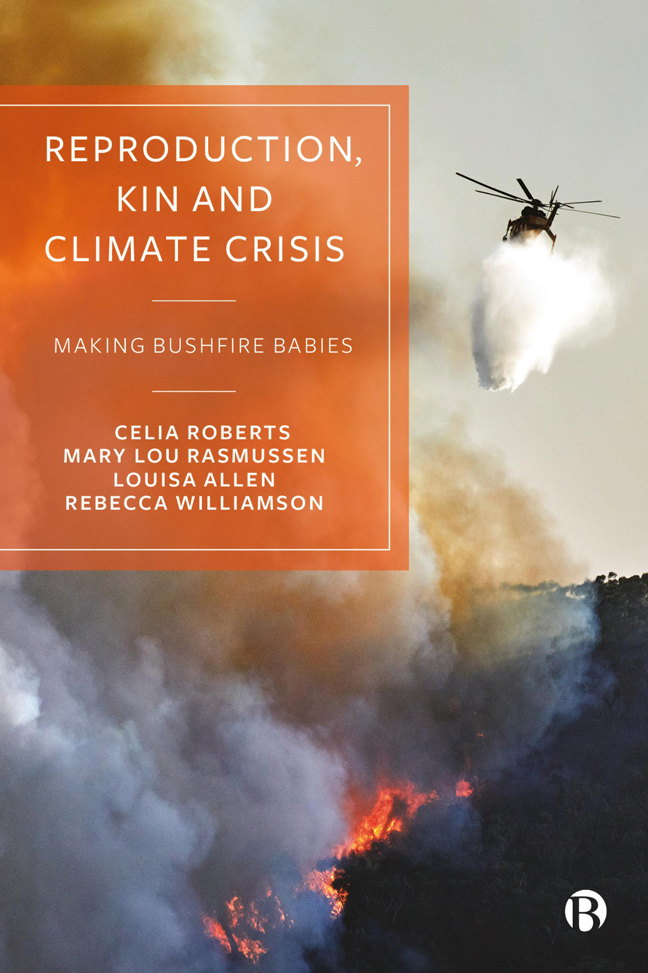Book contents
- Frontmatter
- Contents
- List of Figures and Table
- Notes on the Figures
- Notes on the Authors
- Acknowledgements
- Interleave 1
- 1 Reproducing in Climate Crisis
- Interleave 2
- 2 Methods in Crisis
- Interleave 3
- 3 Breath, Breathing and ‘Mum-Guilt’
- Interleave 4
- 4 Smoke, Machines and Public Health
- Interleave 5
- 5 Kin, Care and Crises
- Interleave 6
- 6 Pyro-reproductive Futures
- Interleave 7
- 7 Making Bushfire Babies
- Notes
- References
- Index
Interleave 7
Published online by Cambridge University Press: 24 January 2024
- Frontmatter
- Contents
- List of Figures and Table
- Notes on the Figures
- Notes on the Authors
- Acknowledgements
- Interleave 1
- 1 Reproducing in Climate Crisis
- Interleave 2
- 2 Methods in Crisis
- Interleave 3
- 3 Breath, Breathing and ‘Mum-Guilt’
- Interleave 4
- 4 Smoke, Machines and Public Health
- Interleave 5
- 5 Kin, Care and Crises
- Interleave 6
- 6 Pyro-reproductive Futures
- Interleave 7
- 7 Making Bushfire Babies
- Notes
- References
- Index
Summary
Finally seeing clear sky: Rebecca's story
I started looking at our garden as a possible fire risk and started googling ‘fire resistant’ plants. The gum trees we love across the road leading from the nature reserve became less attractive. My husband put socks full of sand in the gutters in case we had to fill them with water. The air at this time felt so dry I almost imagined it crackling. For several days, sleep was constantly disrupted by checking in on the radio and apps. I burst into tears at one point and suggested to him that we leave and stay with friends in town (he was much calmer than me). He decided he was okay to stay at the house and use the hoses to hose down the garden and roof if necessary, but would leave when advised to. I was okay with this – at one level I was aware ‘rationally’ that the fires were not likely to reach us, but I was still pretty on edge and felt vulnerable knowing they were relatively close, and that an ‘ember attack’ (which sounded very dramatic and militarized) was within the realms of possibility if the wind changed. I was finding it stressful staying home (exacerbated by the disrupted sleeping), so my daughter and I spent the weekend with friends in Bungendore and Civic (central Canberra).
On several days we found burnt gum leaves blowing on the deck and fine ash on the cars. The gum leaves I found particularly disturbing; it seemed to bring home/make intimate the loss of wildlife and trees and plants in Namadgi [a National Park south of Canberra]. Again, as significant places and walks in Namadgi were burnt, we felt really upset, knowing how stunningly beautiful and full of wildlife those places had been and that we’d recently been walking in them with family from the UK. On another occasion I remember driving home from work as the fires were near Tidbinbilla reserve (a favourite walking and picnic place that we regularly visit) and parking up near the Arboretum to watch. I felt upset because I could see how close the fires were and assumed that the areas that we knew so well had been/would be destroyed, or at least transformed beyond recognition (thankfully it wasn’t, only back sections of the reserve were burnt, although 80 per cent of Namadgi National Park was burnt).
- Type
- Chapter
- Information
- Reproduction, Kin and Climate CrisisMaking Bushfire Babies, pp. 177 - 180Publisher: Bristol University PressPrint publication year: 2023



